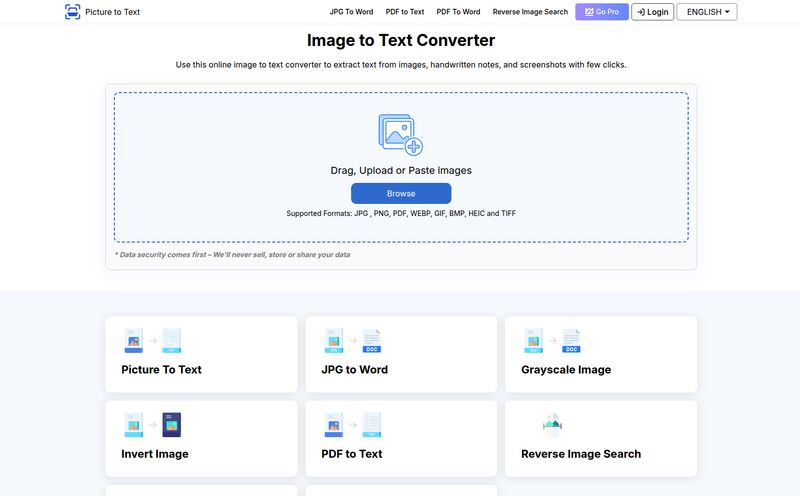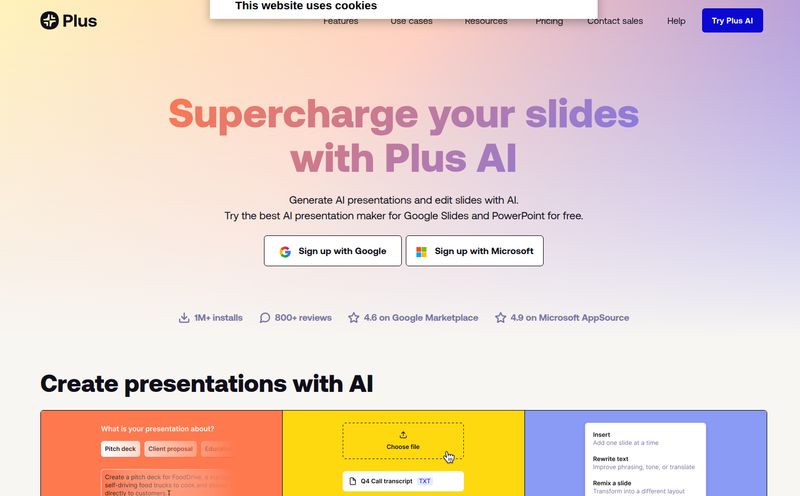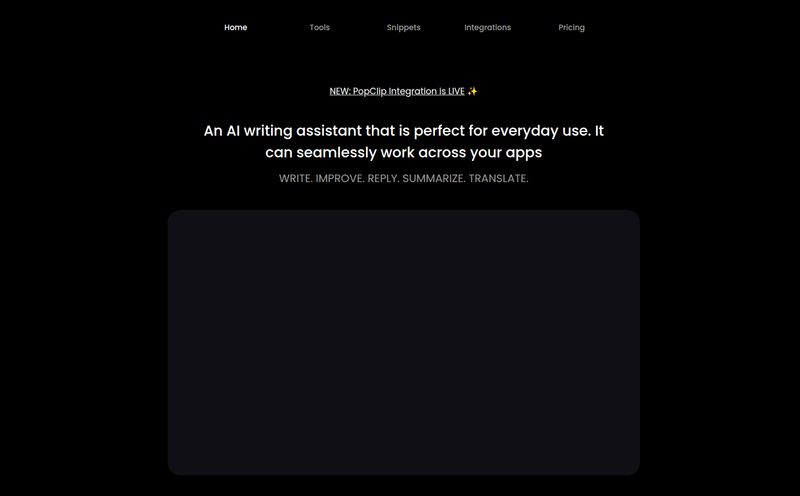We've all been burned by bad audio transcription. You know the feeling. You feed a pristine audio file into some service, wait five minutes, and get back a word salad that looks like it was written by a caffeinated squirrel. Cleaning it up is the digital equivalent of scrubbing floors with a toothbrush. A total pain.
For years, accurate, fast, and affordable speech-to-text (STT) felt like a pipe dream. Then OpenAI dropped Whisper, and the game changed. Suddenly, incredibly accurate transcription was available to everyone. But running it yourself? That's a whole other can of worms involving GPU costs, server maintenance, and a lot of headaches. I've seen teams sink weeks into just getting a stable instance running.
So, when a platform like Gladia comes along, claiming to offer an enhanced Whisper experience through a simple API, my curiosity is definitely piqued. They promise speed, precision, and scalability without the infrastructure nightmare. But does it live up to the hype? I decided to take a closer look.
What Exactly is Gladia Anyway?
At its core, Gladia is a Speech-to-Text API. But calling it just that feels a bit reductive. Think of it less as a simple transcriber and more as an audio intelligence engine. It’s built on a souped-up version of Whisper, which they've optimized for performance and accuracy. One of the big things they talk about is their "Whisper-Zero" model, which aims to cut down on those pesky AI “hallucinations” – where the model just makes stuff up. A very welcome improvement.
So, you're not just turning audio into text. You're getting a tool that can transcribe, translate into 99 different languages, and pull out valuable data from unstructured audio. It’s about turning a messy audio file into structured, usable knowledge. And for businesses, that's where the real gold is.

Visit Gladia
The Features That Actually Matter to Developers and PMs
A long list of features is one thing, but what actually moves the needle when you're building a product? I’ve found a few things in Gladia that stand out from the crowd.
Blistering Speed and Rock-Solid Accuracy
Gladia's homepage throws around terms like "transcribe calls in milliseconds." Bold claim. But in the world of real-time applications, like live captions for a virtual meeting or an AI sales assistant, speed is everything. The goal is to make the transcription feel instantaneous, and Gladia gets impressively close. This isn't just a quality-of-life thing; it's what makes certain product ideas feasible in the first place.
The accuracy is the other side of that coin. A fast but inaccurate transcript is just fast garbage. Because Gladia has fine-tuned its models, the word error rate is remarkably low. This means less time for your users (or your team) to manually correct transcripts, which is a huge, often hidden, operational cost.
It Speaks Your Language (and 98 Others)
This is a big one. The platform supports a massive number of languages, and not just for transcription but for translation too. What I find particularly cool is the code-switching support. Ever been on a call where people mix English and Spanish, or French and Arabic, sometimes in the same sentence? Most STT systems completely fall apart. Gladia is designed to handle this, which is a massive advantage for any company operating in a multilingual market. It's like having a UN translator on standby who never misses a beat.
More Than Just Words: Speaker Diarization and Audio Intelligence
Knowing what was said is great. Knowing who said it is often more important. Gladia's speaker diarization feature tags different speakers in the audio, so you get a transcript that reads like a script:
Speaker 1: "We need to increase the marketing budget."
Speaker 2: "I agree, but where will the funds come from?"
This is absolutely essential for meeting summaries, call center analytics, and compliance recordings. On top of that, you get add-ons like word-level timestamps (pinpointing exactly when a word was said) and automatic summarization. These are the tools that elevate a simple transcription service into a proper data analysis platform.
Putting Gladia to the Test: Where Does it Shine?
Based on its feature set, Gladia seems tailor-made for a few key areas. If you're in the workspace collaboration space, building the next big meeting platform, this is a no-brainer. Live transcription, speaker-separated notes, and summaries are table stakes now.
For content and media – think podcasters, video creators, journalists – the high accuracy and fast turnaround can drastically cut down on production workflows. And for call centers, the ability to transcribe and analyze thousands of customer calls for sentiment, compliance, and agent performance is invaluable.
Let’s Talk Money: The Gladia Pricing Breakdown
Alright, this is often the make-or-break moment. How much is this going to cost? Gladia's pricing is pretty straightforward, which I appreciate. No confusing credit systems or hidden fees from what I can see.
Here’s a simplified look at their plans:
| Plan | Cost | Best For |
|---|---|---|
| Free | $0 / month | Developers, startups, and anyone wanting to test the waters. Includes a generous 10 hours of transcription per month. |
| Pro | Custom / per hour | Growing businesses with scaling digital audio needs. You get access to more advanced features. You'll need to contact sales for the exact rate. |
| Enterprise | Custom | Large organizations needing custom solutions, SLAs, dedicated support, and advanced security features. |
My take? The Free tier is fantastic. 10 hours is more than enough to properly integrate the API and validate if it works for your project without pulling out a credit card. The Pro plan's "Custom per hour" model is interesting. It's a true pay-as-you-go system, which can be cost-effective, but it also means you need a good grasp of your expected usage to forecast costs. For big players, the Enterprise plan makes sense for the support and security guarantees.
The Not-So-Perfect Bits (Because Nothing Is)
No tool is perfect, and it’s important to go in with eyes open. While Gladia is impressive, there are a couple of things to keep in mind.
First, AI hallucinations are a fact of life with current-gen models. Gladia has done a lot to minimize them with Whisper-Zero, but you might still see an occasional odd word or phrase, especialy with poor quality audio. It’s not magic. Second, the usage-based pricing of the Pro plan can be a double-edged sword. It's great for variable workloads, but if you have a sudden spike in usage, your bill could be a surprise. Lastly, some of the most exciting audio intelligence add-ons are still rolling out, so you might have to wait a bit for a specific feature you're looking for.
My Final Take: Is Gladia Worth Integrating?
So, what’s the verdict? In my opinion, yes. Gladia is a very compelling product. It takes the raw power of a groundbreaking open-source model like Whisper and wraps it in a reliable, fast, and developer-friendly package. It solves the massive infrastructure and maintenance problem that stops most companies from using Whisper at scale.
If you're a developer or a product manager who needs to process audio, Gladia should be high on your list to test. The generous free tier makes it a no-risk proposition to try out. It's a powerful tool that feels like it’s built by people who actually understand the problems developers face when dealing with audio data.
Frequently Asked Questions about Gladia
- Is Gladia just a wrapper for OpenAI's Whisper?
- Not exactly. While it uses Whisper as a foundation, Gladia has built a lot of proprietary tech on top. This includes optimizations for speed, accuracy improvements (like their Whisper-Zero model to reduce errors), and enterprise-grade features like speaker diarization and robust security compliance.
- How does the pricing work for the Pro plan?
- The Pro plan is a usage-based, pay-as-you-go model charged per hour of audio processed. The exact rate is custom, so you'll need to contact their sales team to get a quote based on your expected volume and feature requirements.
- Is Gladia secure for sensitive data?
- Yes, security seems to be a major focus. They are GDPR compliant and the pricing page mentions HIPAA, AICPA SOC Type 2, and ISO 27001 compliance, which are critical certifications for handling sensitive data in sectors like healthcare and finance.
- What's the learning curve for developers?
- The learning curve appears to be quite low. It’s an API, and they provide clear documentation and code snippets. If you've ever integrated any other REST API, you should feel right at home. The goal is to get you up and running quickly.
- Can I cancel my plan whenever I want?
- Yes, according to their FAQ, you can change or cancel your plan at any time, which offers great flexibility for projects that might pivot or have changing needs.
Wrapping It Up
The days of tolerating mediocre transcriptions are over. Tools like Gladia are setting a new standard for what we should expect from audio processing. With its blend of speed, accuracy, multilingual capabilities, and a developer-first mindset, it's a formidable player in the STT space. If your business touches audio in any way, you owe it to yourself to give their free plan a spin. You might be surprised at how much value you can unlock from a simple conversation.



